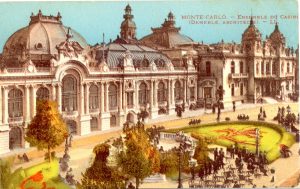
The Casino at Monte Carlo where Charles Deville Wells broke the bank several times in July and August 1891
On this day 125 years ago, a commentary in the Nottingham Evening Post reflects Victorian views on gambling, an activity which many people regarded as a grave sin, on a par with drunkenness and sexual immorality:
Lotteries are, as we all know, illegal in England and most other civilised countries, but an attempt is being made to introduce the system of State lotteries in Louisiana, which, in spite of the opposition of the Governor, may be successful, inasmuch as the Lottery Company offers to give $1,250,000 for a twenty-five years’ concession, the money to be applied to purposes of education, to pensions, and to charitable uses. The proffered bribe is a huge one, but Governor Nichols has hitherto stood firm, and will no doubt remain so; the question is whether he will be backed up by the State authorities.
The principle behind the proposed lottery in Louisiana is rather similar to the arrangement in Monte Carlo, in which the Casino paid a substantial yearly amount to the royal household as well as financing public services such as the police, education, sanitation, hospitals and public works. This financial support meant that the citizens of Monaco never had to pay taxes – a situation which still exists today.
One person who took advantage of the existence of the Monte Carlo casino was, of course, Charles Deville Wells. On this day 125 years ago he was spending his third day at the gambling tables, where he had already broken the bank several times. His story will be continued here over the next few days.
Incidentally, if you enjoy excerpts such as the one above, you will find it interesting to visit the website of the British Newspaper Archive, where millions of pages of 19th and 20th century newspapers can be searched and browsed. The site allows you carry out searches free of charge, and there are various packages available from £12.95 per month to view as many pages as you wish. (I gather you are allowed three complimentary page views as a free trial. And having after your subscription runs out you may subsequently be offered very inexpensive packages from as little as £1 per month from time to time). http://www.britishnewspaperarchive.co.uk
I used this resource extensively when researching The Man who Broke the Bank at Monte Carlo – Charles Deville Wells, gambler and fraudster extraordinaire, as well as my previous book, Hitler’s Last Army – German POWs in Britain. I have also used it when researching my own family history, and was astonished to find several references to my great-grandfather – including one where, as a young boy, he had a brush with the law having damaged a neighbour’s gate!
